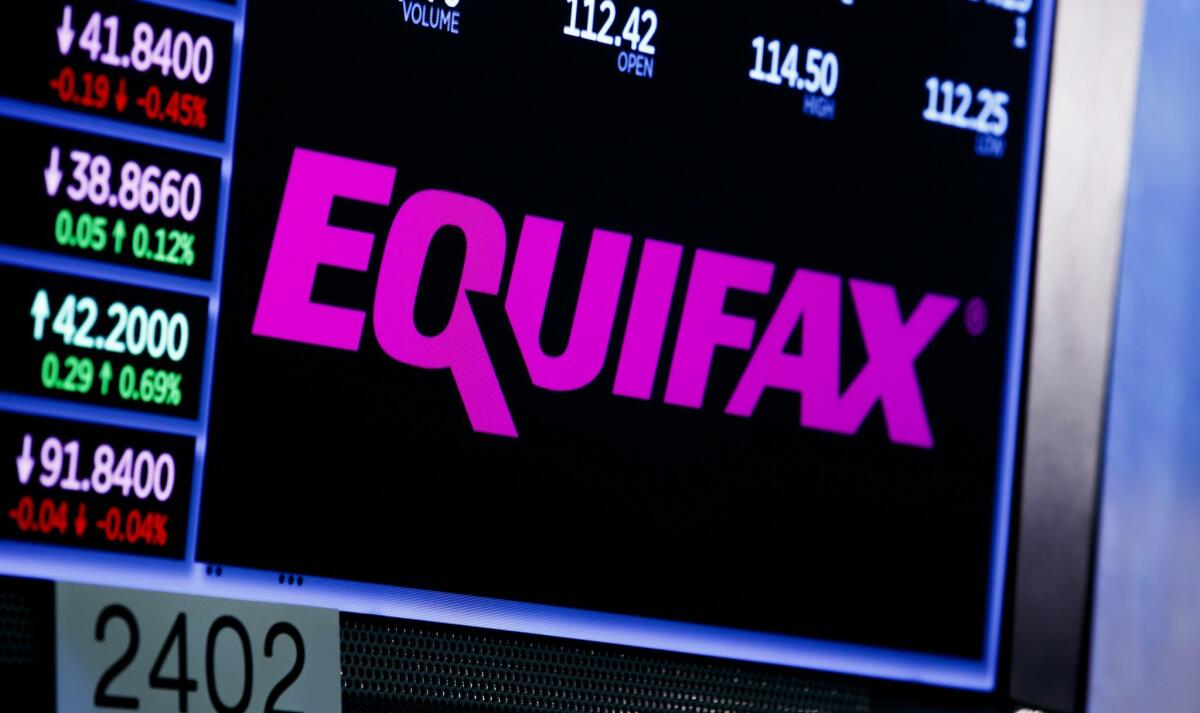Newsletter: Cal Inc.: It’s not about the Equifax settlement cash. It’s about sending a message

- Share via
I’m Los Angeles Times consumer columnist David Lazarus. You were probably as cheesed as I was the other day to learn from the Federal Trade Commission that there wasn’t enough cash on hand to meet demand for compensation related to the Equifax data breach. I wrote in my column that everyone should put in a claim because, if for no other reason, Equifax was hoping you wouldn’t. That column got hundreds of thousands of hits and helped trigger a tsunami of claims. Now the FTC is saying most people will receive “nowhere near” the full $125 they’d been promised.
Here’s what happened: While Equifax agreed to pay as much as $700 million related to its exposing the personal info of 147 million people, only about half that sum was earmarked for compensation. Now we’re learning from the FTC that only 10% of the compensation cash is going toward the $125 payouts. The rest will cover a few years of credit monitoring for those who took that instead.
My advice hasn’t changed. If you don’t already have credit monitoring, go for that. It’s an important resource for consumers and everyone should be covered. If you’re already monitoring your credit files, claim the cash. Even if you don’t get $125 — even if you get just 25 cents — don’t let Equifax off the hook.
This was never about scoring a windfall for a European vacation. This was about sending a message. A message to federal authorities that we take privacy violations seriously, and a message to businesses that if they drop the ball in protecting us from hackers, it’s going to cost them, big time. One upshot of swamping the FTC and Equifax in claims is that, the next time some company negligently exposes customer data to hackers — and there will be a next time — consumers will expect some payback, and more money probably will be allotted to making people whole.
If you haven’t already submitted a claim, go to EquifaxBreachSettlement.com.
And here’s a tip: If you’re a Southern California AAA member, you’re entitled to free credit monitoring as part of your benefits. The AAA website will try to steer you toward coverage that comes with monthly fees. Don’t do it unless that’s what you want. Sign up for the “Essential” plan that costs nothing extra.
If you’re already a victim of fraud or identity theft, credit monitoring won’t be sufficient. Look into “freezing” your credit files, which will prevent hackers from opening bank or credit card accounts in your name.
And with that out of the way, here are some upcoming news events and a few stories from last week that caught my eye:
LOOKING AHEAD
Hackers conference: The Black Hat USA conference, now in its 22nd year, brings the world’s top hackers and information security experts to Las Vegas. Be on the lookout for some scary headlines on Wednesday and Thursday as researchers reveal the latest vulnerabilities they’ve uncovered.
Ride-hailing earnings: It’s a big week for some of the nation’s newest publicly traded tech firms, with Lyft and Uber both posting earnings. Lyft discloses its financial results on Wednesday; Uber on Thursday.
STORY LINES
Masterpiece or Mastercard? When the rich need spending money, some are choosing to turn their art collections into credit cards. Art-secured lending allows wealthy collectors to borrow against their Warhols and Rothkos in the latest collision of fine art and finance.
Farming for solar: With less water to go around, California’s agriculture industry might scale back. Solar energy projects could help pick up the slack on farmland, replacing jobs and tax revenue in the Central Valley. Such efforts may also prove vital in meeting the state’s environmental goals.
Carry on: Since airlines began charging for checked bags, frugal passengers have embraced carry-ons — leading to fights for precious overhead storage space. In an attempt to solve this problem of their own creation, airlines are toying with larger overhead bins. But don’t expect them to ease carry-on size restrictions.
WHAT WE’RE READING
Hit count: The stars of the “Fast and Furious” franchise reportedly had an unusual demand: the other guy has to lose the fight. Making sure each marquee actor looks as tough as his co-star posed a challenge to filmmakers, the Wall Street Journal reports.
Ring: In exchange for gadgets and potential access to security camera footage, police departments around the country have reportedly signed deals with the surveillance firm Ring to advertise its products. Such deals — first reported by Vice’s Motherboard tech site — required at least one police department to engage in community “outreach efforts on the platform to encourage adoption of the platform/app.”
Let me know what you think of the newsletter. My email is david.lazarus@latimes.com, or you can find me on Twitter @Davidlaz. Also, tell all your social media pals to join the party.
Until next time, see you in the Business section.
More to Read
Inside the business of entertainment
The Wide Shot brings you news, analysis and insights on everything from streaming wars to production — and what it all means for the future.
You may occasionally receive promotional content from the Los Angeles Times.











